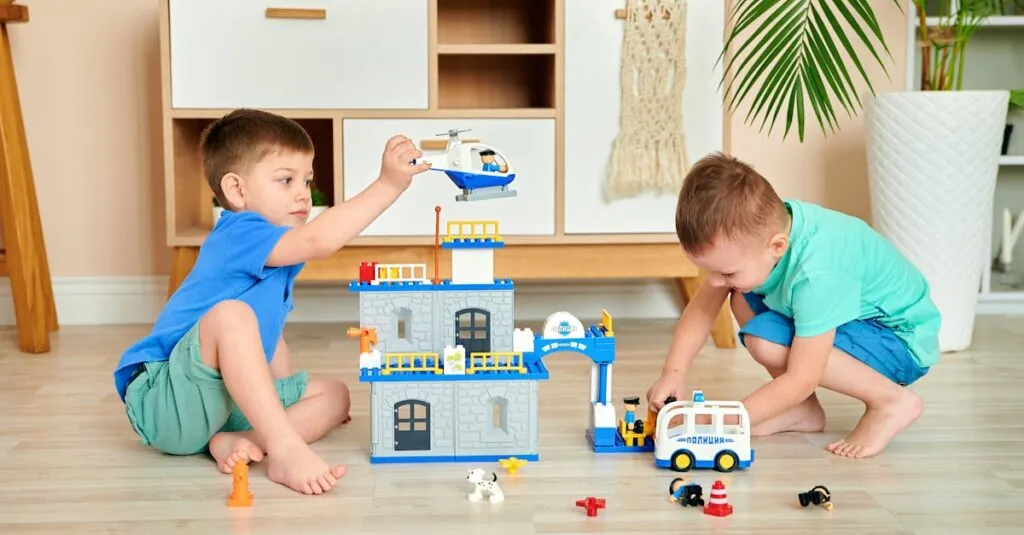In a world where parents hover like helicopters ready to swoop in at the slightest hint of trouble, it’s time to explore some fresh alternatives. Helicopter parenting might seem like the ultimate safety net, but it often leaves kids tangled in a web of overprotection and anxiety. So what’s the secret sauce for raising independent, resilient children without the constant buzz of parental blades overhead?
Table of Contents
ToggleUnderstanding Helicopter Parenting
Helicopter parenting involves parents closely monitoring and controlling their children’s lives. This strategy can lead to various consequences that affect children’s growth and development.
Definition of Helicopter Parenting
Helicopter parenting refers to a style where parents overly involve themselves in their children’s activities. This includes constantly supervising and making decisions for them. Such behavior typically stems from a desire to protect children from failure and harm. As a result, children may struggle to develop autonomy and decision-making skills essential for adulthood.
Impact on Child Development
Helicopter parenting can significantly impact a child’s emotional and psychological growth. Studies show that children raised in this environment often experience increased anxiety and lower self-esteem. They may also face difficulties in social situations, as they lack the confidence to navigate challenges independently. Furthermore, such children may become less resilient when facing obstacles, leading to poor coping skills in adulthood. This parenting style ultimately hinders the development of critical life skills that are vital for success.
Identifying Helicopter Parenting Alternatives
Exploring alternatives to helicopter parenting is crucial for fostering children’s independence and resilience. Parents can adopt strategies that empower their kids rather than control them.
The Role of Authoritative Parenting
Authoritative parenting emphasizes warmth and structure. This style balances responsiveness with high expectations. Parents guide children without micromanaging their decisions. They encourage open communication, helping kids express thoughts and feelings. Increased autonomy emerges in children, promoting confidence and good decision-making skills. Research indicates that children raised under authoritative parenting tend to develop strong social abilities and emotional intelligence. Compared to other styles, it fosters a supportive environment where kids thrive.
Benefits of Encouraging Independence
Encouraging independence fosters essential life skills. Children who engage in self-directed activities develop problem-solving abilities. Taking risks in a safe environment can build resilience. They learn to face challenges, improving their coping strategies. Successful independent experiences contribute to stronger self-esteem. As kids make choices, they understand consequences, reinforcing accountability. Moreover, these experiences help establish a foundation for effective communication in future relationships. Children adept in independence often navigate social situations with greater ease compared to those who experience overprotection.
Practical Strategies for Implementing Alternatives
Implementing alternatives to helicopter parenting involves specific strategies that foster independence and resilience in children.
Fostering Problem-Solving Skills
Creating opportunities for problem-solving allows children to confront challenges directly. Engaging them in age-appropriate tasks lets them practice critical thinking and creativity. For example, assigning household chores encourages kids to develop solutions based on their observations. Involving children in family decision-making fosters collaboration, helping them learn to evaluate options and anticipate outcomes. Encouraging open discussions about challenges enhances their ability to articulate thoughts and feelings, reinforcing their problem-solving capabilities. Research shows that children strong in problem-solving tend to adapt better to new situations and environments later in life.
Supporting Decision-Making Processes
Encouraging children to make choices about daily activities builds confidence in their decision-making skills. Providing options in simple choices, such as selecting outfits or planning meals, empowers them to express their preferences. Introducing them to scenarios with clear consequences helps them understand the impact of their decisions. As they weigh pros and cons, they develop a more nuanced understanding of responsibility. Practicing these decision-making opportunities fosters self-trust and equips children to handle more complex choices as they mature. Ultimately, children who engage in decision-making processes experience increased self-esteem, which aids them in social interactions.
The Importance of Communication
Effective communication plays a crucial role in promoting independence and resilience in children. Establishing strong connections between parents and children enhances understanding and encourages self-expression.
Establishing Open Dialogue
Open dialogue fosters trust between parents and children. Encouraging kids to share their thoughts and feelings allows for healthier emotional processing. Discussions about daily challenges help children feel supported and understood. Active listening skills are vital for parents during these conversations. When children sense that their opinions matter, it boosts their confidence and willingness to engage in difficult topics. Regular check-ins promote a continuous flow of communication, reinforcing their comfort level in addressing concerns.
Balancing Guidance and Freedom
Balancing guidance with freedom supports children’s development. Providing support while allowing kids to navigate challenges promotes autonomy. Children benefit from opportunities to make decisions. Parents can offer guidance, but stepping back encourages children to learn from their experiences. For example, allowing children to solve problems independently prepares them for the real world. Setting appropriate boundaries ensures safety while promoting exploration. Through this approach, kids develop critical thinking skills that improve their adaptability in various situations.
Embracing alternatives to helicopter parenting can significantly enhance a child’s development. By fostering independence and resilience parents equip their children with essential life skills. Encouraging open communication and involving children in decision-making processes cultivates confidence and problem-solving abilities.
Establishing a balance between guidance and freedom is key. When children are allowed to navigate challenges on their own they learn to cope with setbacks and build emotional intelligence. This approach not only prepares them for adulthood but also strengthens their social interactions.
Ultimately a shift from overprotection to supportive independence lays the groundwork for healthier relationships and a more adaptable future.













